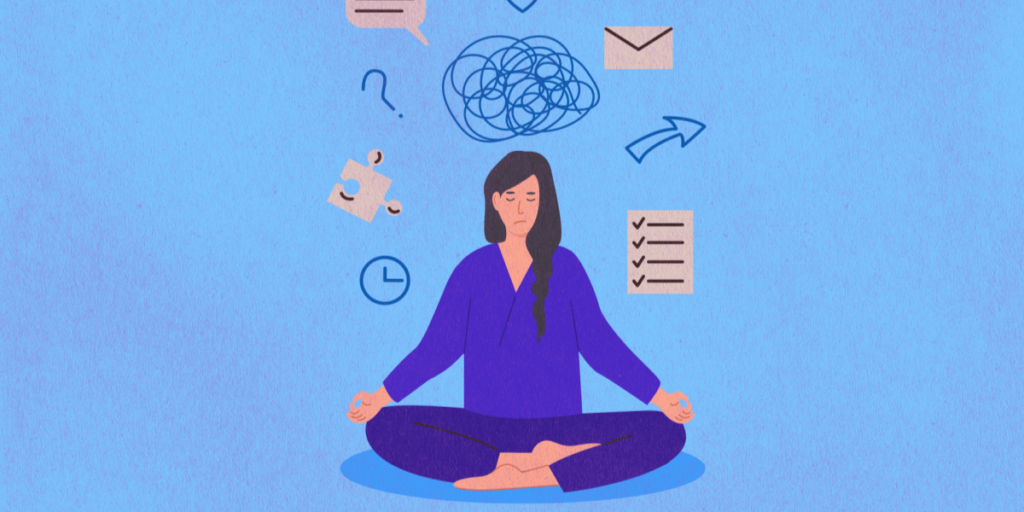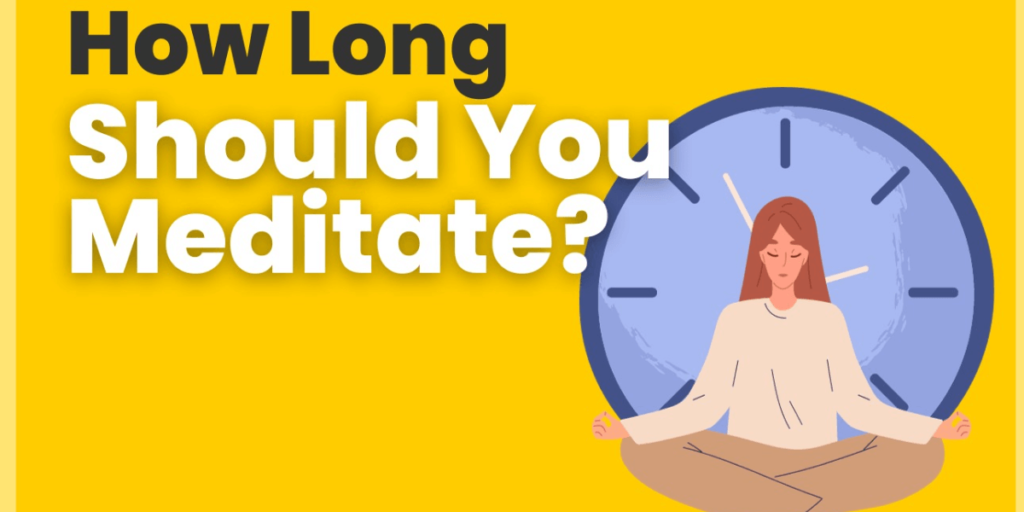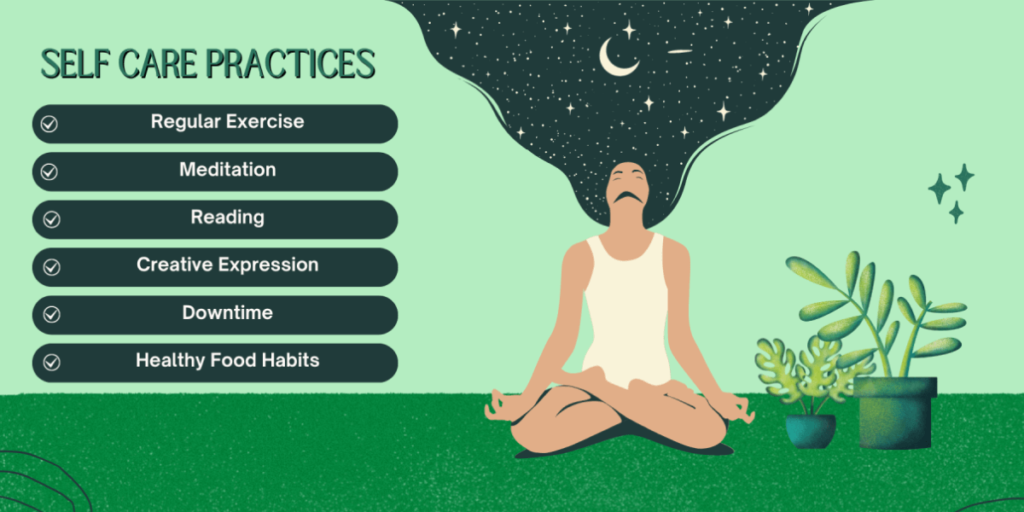Meditation is the practice that involves training the mind to achieve a state of consciousness. This technique allows individuals to focus their minds and achieve mental clarity and emotional stability. One of the most widely recognized benefits meditation offers is stress reduction. It activates the body’s relaxation response, leading to a reduction in cortisol, the stress hormone. Through meditation, people gain a deeper understanding of themselves as it helps individuals recognize thought patterns and behaviors, fostering personal growth and development.
According to research by the National Institute of Health, Meditation may help reduce symptoms of anxiety and stress, improve sleep quality and reduce insomnia, help people recover from substance abuse, and manage eating habits resulting in healthy weight management.
Now, Is Meditation all about sitting still and breathing in and out? Although numerous simple steps can guide you in meditation, they mainly focus on fixing the posture. These quick steps you come across the internet might help you meditate and achieve instant calmness but calmness alone is not enough. For some, reaching the level of calmness has been very difficult. After years of coming across reasons why people find it hard to meditate, we have jotted down a few common reasons that make meditation so difficult and how to tackle them.
Table of Contents
Meditation Practise in Today’s World

In Ancient times, many Sadhus and Yogis chose mountains for their spiritual practice for many reasons. Mountains provide a sense of Isolation. Throughout history, mountains have held symbolic significance, being considered sacred and divine and representing the connection between the earthly and the spiritual realms.
Sadhus live a simple lifestyle and have very few or no possessions which eliminates any distraction or temptation from their lives.
In today’s world of constant distraction, short spans of attention, unrealistic expectations from self and others, and frustration overpowers everything. Meditation seems like a quick way out of all of these. It becomes almost impossible to achieve enlightenment or even stillness through meditation in such circumstances.
The Top 5 Reasons That Make Meditation Challenging
In the modern world, meditation faces several major challenges. Distractions from technology, such as smartphones and constant connectivity, often hinder one’s ability to achieve deep focus. Additionally, the fast-paced lifestyle and high-stress environments prevalent today make it difficult for individuals to find the time and mental space for regular meditation practices. Moreover, misconceptions or lack of understanding about meditation techniques and their benefits can also pose significant hurdles for beginners seeking to start this practice.
Restlessness
Restlessness during meditation is very common. Our minds tend to wander, making it hard to focus on the present moment. Studies have shown that our brains begin to think about actions or reactions related to the activities we were engaged in before meditating. For instance, if you were watching a movie and then started meditating, your brain might start replaying scenes from the movie.
The brain is constantly seeking thoughts and ideas to occupy itself, as it has had very little practice in staying empty. This is why it is advised to meditate early in the morning after waking up as the brain has more concentration and less distracted thoughts.
Uncertainty

Uncertainty often occurs with a lack of self-confidence. It arises from questioning whether you’re doing it right or if it’s working as intended. This can lead to hesitation or a lack of confidence in practicing meditation. It’s natural for these feelings to emerge, especially for beginners.
One must understand that Meditation is not an end goal but a journey of self-discovery. Instead of focusing on perfection or specific outcomes, shift your mindset to view meditation as a journey. You can check out for more information on How to meditate for beginners.
Emotional Challenges
Meditation brings buried or suppressed emotions to the forefront. This might lead to unexpected feelings of sadness, anger, anxiety, or even joy. Acknowledge emotions without judging them as good or bad. Allow them to arise and pass without attachment.
Offer yourself kindness and understanding as you navigate through emotional challenges during meditation. Acknowledging these emotions leads you to understand your emotions better and gradually gain control over them. You can also read more on how to practice mindfulness to be in the present moment.
Impatience and Frustration
Impatience and frustration arise with the expectation of immediate results. The slow progress often frustrates people, mistaking it for no progress. This teaches you to be grounded in your expectations. It teaches you to cultivate patience in life.
Expecting meditation to solve all problems or provide instant resolution would be a mistake. Remember that any obstacle you face while meditating is a sign for you to take control of those emotions.
Physical Discomfort
Another common yet unnoticed challenge can be due to physical discomfort. Most of us have learned to meditate in certain positions and certain mudras. While the positions are to help us focus more, it can be challenging to be comfortable sitting and holding certain postures for extended periods. A slight change like sitting on a cushion, stretching, or yoga before meditation to ease muscle tension can be beneficial.
Effective Ways to Make Meditation Effortless

1. Setting up Practise Time
Setting up a specific time is very important. Our body easily gets habitual with time. It knows when the sun rises and the time it should go to sleep. Practicing at the same time daily allows your mind and body to prepare. Your mind becomes accustomed to entering a meditative state, enhancing the quality of your practice.
It is often advised to meditate at a time when there are no distractions from the outer world. Early morning or the time before bed is advised.
2. Preparing for Meditation
Understanding why we meditate before we meditate gives you the clarity and a purpose to pursue it. In preparation, try to learn the origin and purpose of meditation. Spend some time learning about spiritual enlightenment.
Question yourself what is it that you are aiming for? I would suggest you start with any of the following books for your spiritual journey.
A New Earth: Awakening to Your Life’s Purpose, Eckhart Tolle,
The Book of Awakening: Having the Life You Want by Being Present to the Life You Have, Mark Nepo
Living Buddha, Living Christ, Thich Nhat Hanh
3. Keeping up Consistency
To meditate effectively, it’s essential to incorporate it into your daily life. Rather than focusing solely on outcomes, cultivate the habit of being a meditator who engages in daily practice. Consistency in meditation rewires the brain. Consistency strengthens neural connections associated with attention, emotional regulation, and self-awareness. Over time, this rewiring supports a more effortless meditative state.
4. Clean Environment

A clean and organized space creates a conducive atmosphere for concentration. When there’s orderliness around you, it’s easier for the mind to settle and focus on the meditation practice instead of being distracted by mess.
By adopting a Minimalist lifestyle which promotes tidying up your space, you can minimize visual distractions, allowing you to focus better during meditation. It can uplift your mood and create a more serene atmosphere and positivity around you.
5. Quit Bad Habits
It is surprising how the basic thing is neglected such as quitting bad habits in your daily life. Bad habits like eating mindlessly, smoking, negative approach or even cursing can cloud the mind and impact mental clarity. By quitting these habits, you create space for a clearer and more serene mind during meditation.
Breaking bad habits often involves self-reflection and introspection. This process can deepen your understanding of yourself, leading to a stronger connection between your mind, body, and spirit.
6. Become a Learner
Being a learner means approaching meditation without fixed ideas or expectations. This openness allows you to explore different meditation techniques, philosophies, and experiences without judgment. Opening your mind to various aspects and seeking answers indirectly makes you a seeker and guides you to seek enlightenment.
You will become more accepting of whatever arises during meditation. Whether it’s calmness, distractions, or discomfort without any judgment. This acceptance is a fundamental aspect of mindfulness.
7. Cultivating healthy habits
Good habits foster mindfulness beyond formal meditation sessions. They encourage you to carry mindfulness into everyday activities, promoting a more mindful lifestyle overall. Habits like waking up early, setting a specific time for meditation, or practicing relaxation techniques before meditating can prepare your mind, making the transition smoother.
Healthy habits in life, such as regular exercise, adequate sleep, or maintaining a balanced diet, contribute to emotional stability. A stable emotional state can make meditative sessions more productive and fulfilling.
8. Self-care

Self-care is essential for fulfilling the meditation experience. When basic needs are met, it minimizes distractions during meditation. You’re less likely to be interrupted by hunger, discomfort, or other bodily sensations, allowing for deeper concentration.
Self-care activities such as deep breathing exercises, relaxation techniques, or engaging hobbies help manage stress. Lower stress levels can positively impact your meditative state, making it easier to relax and focus.
9. Gratitude
Gratitude helps shift your focus from what’s lacking or negative to what you appreciate and have in the present moment. During meditation, this shift in focus aids in calming the mind and fostering a positive mindset.
Cultivating gratitude has been linked to decreased stress levels. During meditation, incorporating gratitude techniques can help in relaxation, easing tension, and reducing anxiety.
10. Keeping a Goal
Goals act as motivators, encouraging regular practice. When you have a clear objective in mind, you’re more likely to stay committed to your meditation routine, even when faced with challenges or distractions.
Having a goal in meditation gives you something to focus on during your practice. It could be achieving a particular state of mind (like calmness or clarity), developing specific qualities (such as patience or compassion), or improving your ability to concentrate. This focus guides your meditation sessions, making them more purposeful.
Conclusion
Meditation is not only limited to finding calmness and achieving self-awareness. It also involves developing a deeper understanding of spiritual meaning and connection with a higher power, making stress reduction, calmness, and mental clarity byproducts. Meditation does not constrain one’s religious belief as it works for anyone regardless of their belief and religion.
Your spiritual journey can begin by asking yourself questions like, “Am I hoping for inner peace?” “Am I looking for a more fulfilling life?” “Do I just want to explore awareness?” “Am I seeking to further my spiritual development?” or “Am I looking for Nirvana?”. There are endless possibilities and discoveries Meditation leads to. Which path are you trying to pursue? Do leave a comment with your plan of action and purpose for meditating.
Frequently Asked Questions
How often should I meditate?
It is generally recommended to meditate no less than 15 minutes per day. You can meditate more often according to your desire keeping the time stamp at least 15-20 minutes for each session.
What is a good meditation routine?
A good meditation routine is the one that works the best for you. The key is to build a habit of meditating consistently to get the most out of it.
Why meditate?
People meditate to keep healthier relationships and experience mental peace. There are a lot of benefits to meditation. It can help you elevate a good state of mental health and reduce symptoms of anything that blocks the way.
How long should I meditate a day?
A good 15-20 minutes per day of meditation is ideal. If you are on a quest of spiritual journey you can increase the time for each session and practice meditation more often.
Can anyone meditate?
Yes, people of any age group can meditate. Meditation has no harm as long as you are in a safe and sound environment to practice it. If you are under a doctor’s supervision, it is recommended to talk with them before starting meditation.
